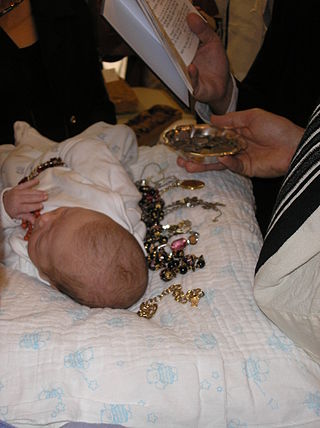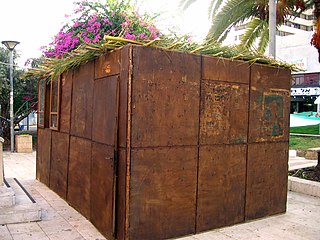
Kodashim is the fifth of the six orders, or major divisions, of the Mishnah, Tosefta and the Talmud, and deals largely with the services within the Temple in Jerusalem, its maintenance and design, the korbanot, or sacrificial offerings that were offered there, and other subjects related to these topics, as well as, notably, the topic of kosher slaughter.
Tohorot is the sixth and last order of the Mishnah. This order deals with the clean/unclean distinction and family purity. This is the longest of the orders in the Mishnah. There are 12 tractates:
- Keilim: ; deals with a large array of various utensils and how they fare in terms of purity. 30 chapters, the longest in the Mishnah.
- Oholot: ; deals with the uncleanness from a corpse and its peculiar property of defiling people or objects either by the latter "tenting" over the corpse, or by the corpse "tenting" over them, or by the presence of both corpse and person or object under the same roof or tent.
- Nega'im: ; deals with the laws of the tzaraath.
- Parah: ; deals largely with the laws of the Red Heifer (Para Adumah).
- Tohorot: ; deals with miscellaneous laws of purity, especially the actual mechanics of contracting impurity and the laws of the impurity of food.
- Mikva'ot: ; deals with the laws of the mikveh.
- Niddah: ; deals with the Niddah, a woman either during her menstrual cycle or shortly after having given birth.
- Makhshirin:, the liquids that make food susceptible to tumah.
- Zavim: ; deals with the laws of a person who has had abnormal genital discharge.
- Tevul Yom: deals with a special kind of impurity where the person immerses in a mikveh but is still unclean for the rest of the day.
- Yadayim: ; deals with a Rabbinic impurity related to the hands.
- Uktzim: ; deals with the impurity of the stalks of fruit.
A terumah, the priestly dues or heave offering, is a type of offering in Judaism. The word is generally used for offerings to God, but can also refer to gifts to a human.
Terumot is the sixth tractate of Seder Zeraim of the Mishnah and of the Jerusalem Talmud. This tractate discusses the laws of teruma, a gift of produce that an Israelite farmer was required to set aside and give to a kohen (priest). There were two kinds of terumot given to the priest: the regular heave-offering, known also as the terumah gedolah, which the Israelites were required to give to the priest from the produce of their fields; the other was the terumat ma'aser, namely, the gift that the Levites were required to put aside for the priests from the tithe which ordinary Israelites had been required to give to them.

Pesachim, also spelled Pesahim, is the third tractate of Seder Moed of the Mishnah and of the Talmud. The tractate discusses the topics related to the Jewish holiday of Passover, and the Passover sacrifice, both called "Pesach" in Hebrew. The tractate deals with the laws of matza and maror, the prohibitions against owning or consuming chametz (leaven) on the festival, the details of the Paschal lamb that used to be offered at the Temple in Jerusalem, the order of the feast on the first evening of the holiday known as the Passover seder, and the laws of the supplemental "Second Pesach".
Hullin or Chullin is the third tractate of the Mishnah in the Order of Kodashim and deals with the laws of ritual slaughter of animals and birds for meat in ordinary or non-consecrated use, and with the Jewish dietary laws in general, such as the laws governing the prohibition of mixing of meat and dairy.
Parah (Hebrew: פָּרָה) is the name of a treatise in the Mishnah and the Tosefta, included in the order Tohorot. The Pentateuchal law decrees that a red heifer, "wherein is no blemish, and upon which never came yoke," shall be burned and her ashes mixed with spring water, that the compound so obtained may be used to sprinkle and cleanse every one who becomes unclean. The burning of the heifer and the preparation of the ashes, as well as the fetching of the water and its mixture for sprinkling, were attended by strict ceremonies. The treatise Parah contains a detailed description of these ceremonies, as well as various regulations concerning the purity of the water for sprinkling and its different effects.
Makhshirin is the eighth tractate, in the Mishnah and Tosefta, of the sixth Talmudic order Tohorot ("Purifications"). This tractate contains six chapters, divided respectively into 6, 11, 8, 10, 11, and 8 sections, while the Tosefta has only three chapters and 31 sections. It treats of the effects of liquids in rendering foods with which they may come into contact susceptible, under certain conditions, of Levitical uncleanness.
Zavim is the ninth tractate in the Mishnah and Tosefta of the sixth Talmudic order Tohorot. It deals with the laws of the zav and zavah, based on Leviticus 15.
Yadayim is a tractate of the Mishnah and the Tosefta, dealing with the impurity of the hands and their ablution. It is eleventh in the order Tohorot in most editions of the Mishnah.

Chukat, HuQath, Hukath, or Chukkas is the 39th weekly Torah portion in the annual Jewish cycle of Torah reading and the sixth in the Book of Numbers. The parashah sets out the laws of corpse contamination and purification with the water of lustration prepared with the Red Cow. It also reports the deaths of Miriam and Aaron, the failure of Moses at the Waters of Meribah, and the conquest of Arad, the Amorites, and Bashan. The parashah comprises Numbers 19:1–22:1. The parashah is the shortest weekly Torah portion in the Book of Numbers, and is made up of 4,670 Hebrew letters, 1,245 Hebrew words, 87 verses, and 159 lines in a Torah Scroll.
In Jewish religious law, there is a category of specific Jewish purity laws, defining what is ritually impure or pure: ṭum'ah and ṭaharah are the state of being ritually "impure" and "pure", respectively. The Hebrew noun ṭum'ah, meaning "impurity", describes a state of ritual impurity. A person or object which contracts ṭum'ah is said to be ṭamé, and thereby unsuited for certain holy activities and uses until undergoing predefined purification actions that usually include the elapse of a specified time-period.
Nazir is a treatise of the Mishnah and the Tosefta and in both Talmuds, devoted chiefly to a discussion of the laws of the Nazirite laid down in Numbers 6:1-21. In the Tosefta its title is Nezirut ("Nazariteness"). In most of the editions of the Mishnah, this treatise is the fourth in the order Nashim, and it is divided into 9 chapters, containing 48 paragraphs in all.

Sukkah is a tractate of the Mishnah and Talmud. Its laws are discussed as well in the Tosefta and both the Babylonian Talmud and Jerusalem Talmud. In most editions it is the sixth volume of twelve in the Order of Moed. Sukkah deals primarily with laws relating to the Jewish holiday of Sukkot. It has five chapters.
Tohorot is a tractate in the Mishnah and Tosefta, treating especially of the lesser degrees of uncleanness the effects of which last until sunset only. In most editions of the Mishnah it is the fifth tractate in the order Tohorot. It is divided into ten chapters, comprising ninety-six paragraphs in all.

Shabbat is the first tractate of Seder Moed of the Mishnah and of the Talmud. The tractate deals with the laws and practices regarding observing the Jewish Sabbath. The tractate focuses primarily on the categories and types of activities prohibited on the Sabbath according to interpretations of many verses in the Torah, notably Exodus 20:9–10 and Deut. 5:13–14.

Bekorot is the name of a tractate of the Mishnah and Talmud which discusses the laws of first-born animals and humans. It is one of the tractates forming Seder Kodashim.
Impurity of the land of the nations is a rabbinic edict stipulating a specified degree of tumah (impurity) on all lands outside the Land of Israel. The demarcation lines of foreign lands effectually included all those lands not settled by the people of Israel during their return from the Babylonian exile during the Second Temple period, and was meant to dissuade the priests of Aaron's lineage from venturing beyond the Land of Israel where graves were unmarked, and who may inadvertently contract corpse uncleanness and thereby eat their bread-offering (Terumah), unawares, in a state of ritual impurity and becoming liable thereby to kareth. The declaration with respect to foreign lands includes also the "virgin soil" of those lands, and was, therefore, a safeguard meant to prevent the priests from inadvertently transgressing the Law of Moses.

Jewish law and custom prescribe ritual hand washing in a number of situations. This practice is generally known by the Hebrew term netilath yadayim, which means "taking up of the hands."
Tractate Eduyot is the seventh tractate in the order Nezikin of the Mishnah.





